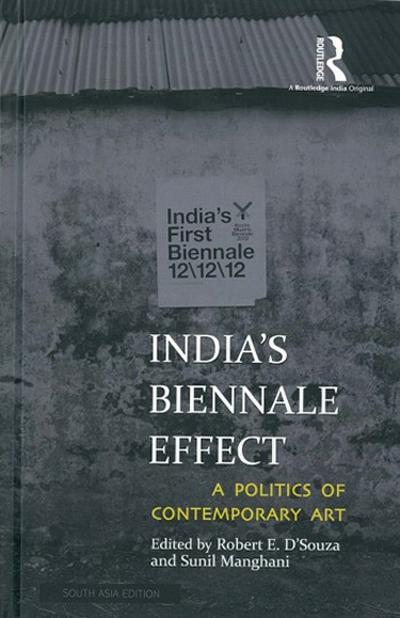
The Kochi-Muziris Biennale was India’s first art biennale, which was launched in December 2012 and holds its fourth edition in December 2018. It is an international exhibition of contemporary art held in Fort Kochi, in Kerala. Every two years, works are shown in converted galleries and halls, and site-specific installations in public spaces, heritage buildings and disused structures. Up to 100 international artists have been represented in each of its successive editions under the curatorship of notable Indian artists. The first edition attracted close to half a million visitors. Various commentaries, including from the former Director of Tate Modern, Chris Dercon, have come to refer to the event as the ‘People’s Biennale’ due to its close connections with the local populations, and also an on-going year-round programme of education, business and innovation and cultural exchange and residencies. Members of the Critical Practice Research Group at Winchester School of Art have engaged with the Biennale since its inception. It provides a fascinating context in which to research, and furthermore the work of the Critical Practices group has fed back to the Biennale to extend the critical thinking of what it means to stage a globally-orientated art ‘perennial’.
The underlying connection with the Kochi Biennale stems from the work of Professor Robert E. D’Souza. He has engaged in design and art practices in the context of India for over a decade. In 2012, he held a solo exhibition at the Delhi gallery of the international advertising agency Wieden + Kennedy (W+K) and also authored Outside India as a hybrid critical volume and exhibition catalogue. At the close of this book D’Souza offers initial reflection on what it might mean for the impending inauguration of the Kochi Biennale. Subsequently, he attended the opening of the first edition in 2012 and wrote a much-cited article for Cultural Politics, ‘The Indian Biennale Effect’ (Vol. 9, No. 3, 2013). While the Biennale inevitably attracted a great deal of interest among the art-world and media, the Biennale organisers have characterized the Cultural Politics article a lone and independent critical account and later arranged for its translation into the local language of Malayalam to enable further dissemination and discussion. In 2014, Professor D’Souza was joined by Professor Sunil Manghani to undertake fieldwork and both attended the Kochi Biennale in the capacity of ‘Biennale Associates’ for the launch of its second edition, under the curatorship of the internationally acclaimed artist Jitish Kallat. D’Souza was invited to install ‘End of Empire’ (from Outside India) as a collateral event, and, in January 2015, D’Souza and Manghani were joined by Professor Ryan Bishop and Dr. August Davis to present a series of talks as part of the Biennale public seminar programme, ‘History Now’.
As a result of numerous visits and engagements with the Biennale, various publications have been produced, most notably D’Souza and Manghani’s book-length study India’s Biennale Effect: A Politics of Contemporary Art (Routledge, 2017). From the on-going collaboration with the Biennale’s founders and key participants, and the incorporation of rich visual material, the book provides detailed examination of the term the ‘biennale effect’ – a layered contestation of place, economics, art and politics. The curator, Ranjit Hoskote, praises the book for mapping ‘the complex and shifting interrelationships among local cultural heritage, a regional art market, and global cultural circulations that define the special nature and potential role of the biennale in India’. While Frances Morris, Director of Tate Modern, similarly acknowledges the book for ‘an array of fascinating insights into the unique conjunction of people, place, time, politics, economics and aesthetics that constitutes India’s first Biennale’.
While the book presents a close reading of the unique context of the Kochi Biennale, it also sets out a broader critical frame for understanding global, contemporary art and its effects. It includes, for example, a detailed dialogue with the co-founder of the Biennale, Riyas Komu. In preparation for the interview Komu made explicit and repeated remarks upon the impact that Winchester School of Art’s research had had on the Biennale, in that it has provided the means of critical, reflexive thinking. Komu is committed to such critical thinking and has welcomed the School’s ongoing engagement. Further plans include a dedicated research network to examine the Biennale’s ‘effects and ecosystems’ pertaining to creative industry in India, as well as the staging of a ‘biennale’ at Tate Modern as part of the School’s association with Tate Exchange. In addition, Shwetal Patel, a key member of the Kochi Biennale inaugural team, is currently undertaking doctoral research on ‘biennale practices’ under the supervision by members of the Critical Practices group.
Related Publications
D’Souza, E.R. and Manghani, S. (2017) ‘Timely Provocations: The 3rd Kochi-Muziris Biennale’, Biennial Foundation, <http://www.biennialfoundation.org>
D’Souza, Robert E., and Manghani, Sunil (eds.) (2017) India’s Biennale Effect: A Politics of Contemporary Art. Delhi: Routledge India.
Manghani, Sunil (2015) ‘Painterly explorations: Notes from India’s Kochi-Muziris Biennale’, Journal of Contemporary Painting, Vol.2, No.1, pp. 75-95.
D’Souza, Robert E. (2014) ‘The Indian Biennale Effect: The Kochi-Muziris Biennale’, trans. into Malayalam. Kochi: Kochi-Muziris Biennale Foundation.
D’Souza, Robert, E. and Cid, D. (2013) Barcelona Masala: Narratives and Interactions In Cultural Space. Barcelona: Actar/Birkhauser.
D’Souza, Robert E. (2013) ‘The Indian Biennale Effect: The Kochi-Muziris Biennale 2012’, Cultural Politics, Vol. 9, No. 3, pp.296-312.
See Also
Reading Room at Winchester School of Art [exhibition], November 2015.
D’Souza, Robert E. (2014) End of Empire [collateral exhibit], Fort Kochi, Kochi-Muziris Biennale, 2014-15.
D’Souza, Robert E. (2012) OUTside INdia [solo exhibition], W+K EXP Gallery in Delhi, India, November – December 2012.